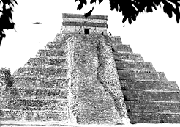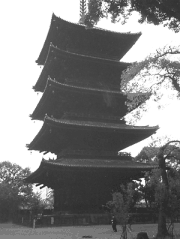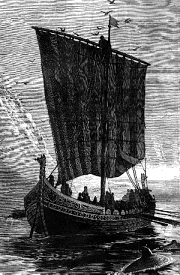 Mayan Pyramid at Chichen Itza Renee Scott  Japanese Pagoda Erik Hjortshoj  Viking Ship (c. 900) |
- 1–49
- Birth of Jesus Christ (variously given from 4 B.C. to A.D. 7). After Augustus, Tiberius becomes emperor (dies, 37), succeeded by Caligula (assassinated, 41), who is followed by Claudius. Crucifixion of Jesus (probably 30). Han dynasty in China founded by Emperor Kuang Wu Ti. Buddhism introduced to China.
- 50–99
- Claudius poisoned (54), succeeded by Nero (commits suicide, 68). Missionary journeys of Paul the Apostle (34-60). Jews revolt against Rome; Jerusalem destroyed (70). Roman persecutions of Christians begin (64). Colosseum built in Rome (71-80). Trajan (rules 98-116); Roman empire extends to Mesopotamia, Arabia, Balkans. First Gospels of St. Mark, St. John, St. Matthew.
- 100–149
- Hadrian rules Rome (117-138); codifies Roman law, rebuilds Pantheon, establishes postal system, builds wall between England and Scotland. Jews revolt under Bar Kokhba (122-135); final Diaspora (dispersion) of Jews begins.
- 150–199
- Marcus Aurelius rules Rome (161-180). Oldest Mayan temples in Central America (c. 200).
- 200-249
- Goths invade Asia Minor (c. 220). Roman persecutions of Christians increase. Persian (Sassanid) empire re-established. End of Chinese Han dynasty.
- 250–299
- Increasing invasions of the Roman empire by Franks and Goths. Buddhism spreads in China. Classic period of Mayan civilization (250–900); develop hieroglyphic writing, advances in art, architecture, science.
- 300–349
- Constantine the Great (rules 312-337) reunites eastern and western Roman empires, with new capital (Constantinople) on site of Byzantium (330); issues Edict of Milan legalizing Christianity (313); becomes a Christian on his deathbed (337). Council of Nicaea (325) defines orthodox Christian doctrine. First Gupta dynasty in India (c. 320).
- 350–399
- Huns (Mongols) invade Europe (c. 360). Theodosius the Great (rules 392-395)—last emperor of a united Roman empire. Roman empire permanently divided in 395: western empire ruled from Rome; eastern empire ruled from Constantinople.
- 400–449
- Western Roman empire disintegrates under weak emperors. Alaric, king of the Visigoths, sacks Rome (410). Attila, Hun chieftain, attacks Roman provinces (433). St. Patrick returns to Ireland (432) and brings Christianity to the island. St. Augustine's City of God (411).
- 450–499
- Vandals destroy Rome (455). Western Roman empire ends as Odoacer, German chieftain, overthrows last Roman emperor, Romulus Augustulus, and becomes king of Italy (476). Ostrogothic kingdom of Italy established by Theodoric the Great (493). Clovis, ruler of the Franks, is converted to Christianity (496). First schism between western and eastern churches (484).
- 500–549
- Eastern and western churches reconciled (519). Justinian I, the Great (483-565), becomes Byzantine emperor (527), issues his first code of civil laws (529), conquers North Africa, Italy, and part of Spain. Plague spreads through Europe (542 et seq.). Arthur, semi-legendary king of the Britons (killed, c. 537). Boethius, Roman scholar (executed, 524).
- 550–599
- Beginnings of European silk industry after Justinian's missionaries smuggle silkworms out of China (553). Mohammed, founder of Islam (570-632). Buddhism in Japan (c. 560). St. Augustine of Canterbury brings Christianity to Britain (597). After killing about half the population, plague in Europe subsides (594).
- 600–649
- Mohammed flees from Mecca to Medina (the Hegira); first year of the Muslim calendar (622). Muslim empire grows (634). Arabs conquer Jerusalem (637), destroy Alexandrian library (641), conquer Persians (641). Fatima, Mohammed's daughter (606-632).
- 650–699
- Arabs attack North Africa (670), destroy Carthage (697). Venerable Bede, English monk (672-735).
- 700–749
- Arab empire extends from Lisbon to China (by 716). Charles Martel, Frankish leader, defeats Arabs at Tours/Poitiers, halting Arab advance in Europe (732). Charlemagne (742-814). Introduction of pagodas in Japan from China.
- 750–799
- Charlemagne becomes king of the Franks (771). Caliph Harun al-Rashid rules Arab empire (786-809): the “golden age” of Arab culture. Vikings begin attacks on Britain (790), land in Ireland (795). City of Machu Picchu flourishes in Peru.
- 800–849
- Charlemagne crowned first Holy Roman Emperor in Rome (800). Charlemagne dies (814), succeeded by his son, Louis the Pious, who divides France among his sons (817). Arabs conquer Crete, Sicily, and Sardinia (826-827).
- 850–899
- Norsemen attack as far south as the Mediterranean but are thwarted (859), discover Iceland (861). Alfred the Great becomes king of Britain (871), defeats Danish invaders (878). Russian nation founded by Vikings under Prince Rurik, establishing capital at Novgorod (855-879).
- 900–949
- Beginning of Mayan Post-Classical period (900–1519). Vikings discover Greenland (c. 900). Arab Spain under Abd ar-Rahman III becomes center of learning (912-961). Otto I becomes King of Germany (936).
- 950–999
- Mieczyslaw I becomes first ruler of Poland (960). Eric the Red establishes first Viking colony in Greenland (982). Hugh Capet elected King of France in 987; Capetian dynasty to rule until 1328. Musical notation systematized (c. 990). Vikings and Danes attack Britain (988-999). Otto I crowned Holy Roman Emperor by Pope John XII (962).




